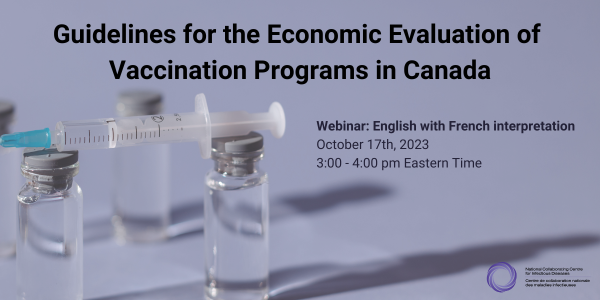
Mathematical modelling is a research method that can improve public health planning and infectious disease control. Big Data refers to very large and diverse datasets that are analyzed at high velocity to reveal patterns, trends, and associations.
NCCID supports an expanding area of knowledge translation and exchange related to mathematical modelling and the use of Big Data for public health.
NCCID brings together modellers, public health practitioners, and decision-makers to respond to public health priorities such as COVID-19, influenza, sexually transmitted and blood-borne infections, and tuberculosis. We build awareness of the value of modelling research and big data, especially amongst public health professionals.
What’s New
Voices of Sovereignty: Navigating Data Sovereignty and Governance for First Nations
This podcast series explores the challenges, opportunities, and best practices surrounding First Nations data ownership, control, access, and possession.
Understanding and Assessing Quantitative Modelling Research
This document provides an overview of how to critically assess a research article which uses quantitative, data-driven mathematical modelling to examine infectious disease transmission. Included is a Quick Reference Guide which aligns with the process of quantitative model development and the format of research articles and is meant to assist in a critical review of the research.
Guidelines for the Economic Evaluation of Vaccination Programs in Canada
This webinar will provide an overview of the new Guidelines for the Economic Evaluation of Vaccination Programs in Canada produced by the National Advisory Committee on Immunizations (NACI).
mod4PH Research Highlights Podcast: NACI Guidelines for economic evaluation of vaccination programs in Canada
This episode will provide an overview of the National Advisory Committee on Immunization (NACI) health economics guidelines for the evaluation of vaccination programs in Canada, and how they can be used to inform best practices and promote standardized and high-quality evidence for public health decision making.
mod4PH Research Highlights Podcast: The Past, Present, and Future of Infectious Disease Modelling for Public Health
In this episode, Dr. Michael Li spoke with us about the past, present, and future of infectious disease modelling, the different roles and responsibilities of a math modeller, and how he envisions math modelling for public health in the future.
Insights for Public Health’s Use of Mobility Data
This case study highlights one team’s experience of using mobile device data to help inform a public health response. Their story provides public health decision-makers, managers, epidemiologists, policy analysts and others with insights and lessons that can help prepare them for working with big data.
Math Modelling
Mathematical modelling helps public health answer some complex, real-world questions that can support evidence-driven responses to infectious disease threats.
An example of how models are developed, interpreted, and applied is illustrated in this video focused on modelling tuberculosis prepared by the NCCID and the National Collaborating Centre for Indigenous Health.
mod4PH Network
One of the ways we support knowledge exchange is through mod4PH, a network of public health professionals and math modellers. Members promote math modelling research to support public health decision-making for infectious disease prevention and control. Join the group on LinkedIn to stay updated on new projects.
The mod4PH podcast showcases new and relevant math modelling concepts and research for public health, featuring infectious disease modelling experts from various fields. Find new episodes of this podcast on the NCCID Webcasts page.

COVID-19 Models from the Public Health Agency of Canada
The Public Health Agency of Canada (PHAC) has shared information with Canadians from their COVID-19 modelling work. The results from the data indicate that it is critical and essential to physically distance, detect and isolate cases of COVID-19, identify and quarantine close contacts, and prevent international infection from entering the country.
Looking for the PHAC Modelling Group?
Big Data
The NCCID brings collaborators together to explore what can be learned from big data to inform public health decision-making for the control of infectious diseases.
Concerns and questions about the ethics of big data for public health purposes are prudent but can also limit knowledge sharing about how these data are or could be useful. NCCID re-frames dialogue on big data with a different question–not ‘What are the risks?’, but ‘What can be learned from big data’?
The Covid-19 pandemic fueled demands for real-time and geo-positioning data to understand emerging risks. Public health authorities looked for ways to understand the influence of travel and mobility factors, as well as the effectiveness of public health measures aimed at limiting mobility, social contact and disease spread. Although the SARS CoV-2 virus is one important area to explore, big data may provide useful insights on other pathogens, drivers and determinants.
NCCID leads several knowledge translation activities on big data for public health, including
- infographics to clarify basic concepts,
- case studies featuring lessons from public health authorities that use big data
- Insights for Public Health’s Use of Mobility Data – A case study featuring lessons learned by the Public Health Agency of Canada
- big data research demonstration projects,
- discussions about ethics, methods, and applicability of big data research findings
Talking About Big Data Use
Public health’s use of big data calls for adherence to privacy laws and ethical standards, but also for our best efforts at open and clear communication with the public about data practices.
NCCID highlights the following educational initiative for the public from the Public Health Agency of Canada (PHAC).
Visit the Public Health Agency of Canada’s Public Health Data web pages to learn about:
- how and why PHAC gathers and analyzes a variety of different data
- how PHAC respects and protects privacy when gathering and using public health data
- innovative public health data projects
Journal Papers
Toward standardizing a lexicon of infectious disease modelling terms




